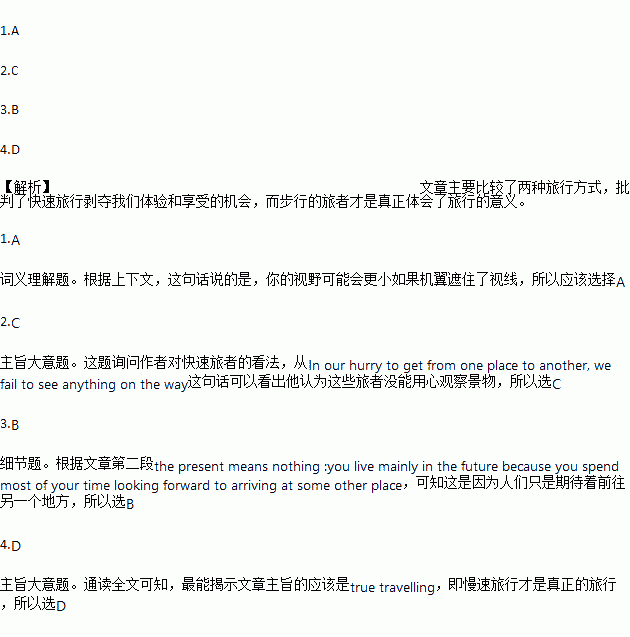题目内容
Future history books might record that we were robbed of the use of our eyes. In our hurry to get from one place to another, we fail to see anything on the way, Air travel gives you a bird’s eye view of the world ---or even less if the wing of the aircraft happens to get in your way. When you travel by car or train, you are moving so quickly that you do not see the countryside clearly. Car drivers are forever thinking about going on and on. They never want to stop. Is it the great motorways that attract them, or what? And as for sea travel, it hardly deserves mentioning. It is perfectly summed up in the words of the old song: “I joined the navy to see the world, and what did I see? I saw the sea.” You mention the place names in the world like EI Dorado, Kabul and someone is sure to say, “I have been there”, meaning I drove through it at 100 miles an hour on the way to somewhere else.
When you travel at high speeds, the present means nothing: you live mainly in the future because you spend most of your time looking forward to arriving at some other place. But actual arrival, when it is achieved, is meaningless. You want to move on again. By traveling like this, you suspend (中止) all experience; the present stops being a reality: you might just as well be dead.
The traveler on foot, on the other hand, lives constantly in the present. For him traveling and arriving are one and the same thing: he arrives somewhere with every step he makes. H e experiences, the present moment with his eyes, his ears and the whole of his body. At the end of his journey he feels a delicious physical tiredness. Satisfying sleep will be his: the just reward of all true travelers.
1.The underlined words “get in your way” in Paragraph I can be replaced, by ____.
A. block your sights
B. expand your range of vision
C. prevent you from going out of the plane halfway
D. make your travel continue
2.What does the author think of the travelers mentioned in Paragraph 1?
A. They get a good view of the landscape.
B. They make full use of their eyes.
C. They fail to see the scenery with their heart.
D. The y are eager to see everything on the way.
3.Why does “the present”mean “nothing ”when we travel at high speeds?
A. Because we change our aims all the time.
B. Because we are eager to go to another place.
C. Because we are looking forward to the future life.
D. Because we cannot enjoy the experience we have had.
4.What would be the best title for the passage?
A. Different travelers B. The use of eyes
C. Ways of traveling D. True traveling

